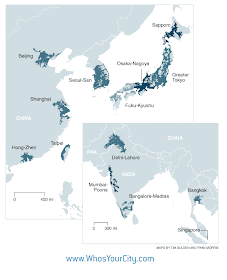
Here's more from the Florida, et al. paper (PDF) on megaregions. This shows the megaregions of Asia. They are:
1) Tokyo, with 55 million people and $2.5 trillion in economic output: the world's largest megaregion.
2) Osaka-Nagoya, to the south of Greater Tokyo on Japan's largest island of Honshu. It has 36 million people, and contributes another $1.4 trillion to the global economy.
3) Fuku-Kyushu straddles the three mjor Japanese islands of Honshu, Shikoku, and Kyushu, and is home to another 18.5 million people.
4) Sapporo, the last of Japan's four megaregions - and it's smallest - is Sapporo, which covers much of the northern island of Hokkaido. (Note that the authors of the paper observe that the boundaries between Japan's four regions are themselves beginning to blur, and that they may be in the process of becoming an integrated "super-megaregion.")
5) Seoul-Busan covers most of the nation of South Korea; it's population is 46 million.
6) Singapore, the city-state at the southern tip of the Malay Peninsula, is home to 6 million, a third of whom actually live across the border in Malaysia.
7) The megaregion around Bangkok has a population of 19 million, and an economic output of $100 billion.
8) The Hong-Zhen megaregion in Southeast China incorporates Hong Kong and the rapidly growing industrial cities of Guangdong province. It has a population of about 45 million.
9) Shanghai anchors a megaregion of 66 million people, though being entirely contained within an emerging economy, it produces only $130 billion in economic output (as of 2007).
10) Beijing anchors China's third megaregion, which is home to 43 million people. (The authors note that per capita economic output is fully 360% higher in these three megaregions thn it is in the rest of China.)
11) Delhi-Lahore is home to a whopping 121 million people: the largest megaregion by population in the world. (The authors also mention that Bangalore-Madras, with 72 million people, and Mumbai-Poona, with 62 million, are likely to become megaregions in the near future, though as yet they don't meet the criterion of having an economic output of at least $100 billion. Interestingly, the near-megaregions of India actually have a lower per cepita GDP than other areas in the country, in contrast to China's disproportionately wealthy megaregions.)
There are three further megaregions beyond those in North America, Europe and Asia. Mexico City, with a population of 45 million and an output of $290 billion, is the largest of these; Rio de Janeiro-Sau Paulo is home to 43 million; and the Middle Eastern conurbation formed by Tel Aviv, Israel, Amman, Jordan, and Beirut, Lebanon has a population of 31 million.
Together, the 40 megaregions of the world count for less than 18% of global population; yet they produce fully 2/3 of the world's economic activity. The authors make the compelling case that these megaregions - rather than cities or nations - provide the best level of economic and social analysis, and that this is the level at which economic development meaningfully occurs. In other words, the rise of the developing economies is not so much a story of the rise of China, India, Brazil, etc.; it's the story of the rise of Hong-Zhen, Delhi-Lahore, and Rio-Paulo. And it's the future of those megaregions which will define the future of the world.
UPDATE: And let's not forget Taipei: 21.8 million souls , all the way up and down the western side of the island of Taiwan.
I recently came across your blog and have been reading along. I think I will leave my first comment. I don’t know what to say except that I have enjoyed reading. Nice blog. I will keep visiting this blog very often.
ReplyDeletehttp://www.factspenisenlargement.com
I believe one and all must glance at it.
ReplyDeleteExcellent maps, I think that they're more clarified that other ones I've seen, I think it'll be so useful for me in order to know all things related to the countries.
ReplyDeletePretty effective data, thank you for this post.
ReplyDeleteIt is amazing and wonderful to visit your site. I've learn many things from your site.
ReplyDeleteBuy Flat Earth Map